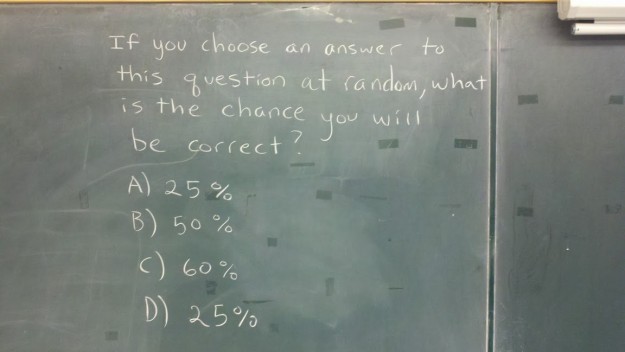
Posted on 11/07/2011 9:23:36 AM PST by Lonesome in Massachussets

It’s a paradox. If 50% is the correct answer, then the correct answer is 25%, if 25% is the correct answer, then the correct answer is 50%.
There can be no correct answer.
A wife knows when her husband is cheating 16 out of 9 times.
None of the above.
0% is the correct answer, but that is because the real correct answer was conveniently not listed.
No, I think that's only if you assume that you have to pick either A., B., C., or D. Nothing here says that you have to do that. You provide the answer of 50%, you do not select a letter. It's in the way you answer this question.
I’m terrible at this kind of thing, but just winging it, let’s look at it objectively, and consider the most obvious things: A and D are both 25% and together,comprise exactly 50% of the possible “at random” answers. B already IS 50%, but by itself would only comprise 25% of the possible “at random” answers, being only ONE at random choice among the other three. C presents itself as a perplexing 60%, which doesn’t seem to fit any “logical” math of a kind we’re used to when given problems like this.
Having said all that, I fail to see how there could be a “correct answer”,since the puzzle is basically a trick designed to confound you into thinking that random choice
could ever be quantifiable. Am I close? Please tell me, because I can’t waste any more time.

Statistically, it’s a paradox. None of the answers are correct due to the way they’re presented.
ouch, you are making my brain hurt
The question started with ‘If you choose an answer...’.
I choose not to choose an answer. Therefore, I am correct 100%.
The answer is 42!
If you choose not to answer, the state of your answer is undefined, essentially the same as 0/0, so I’ll count that as wrong.
Just remember,
You can’t win
You can’t break even
You can’t not play
Wrong Lambert, too.
http://wmbriggs.com/blog/?p=4608
I know;)
Ok, I’ll ask...what is the first best statistics question?
****There can be no correct answer***
Impossible;) LOL!!!
I will say again, I’d say unknown, because the question is not very clear about what it is asking form. What is chosen at random, the letters A-D, or the numbers associated with each?
OK, since it looks like a multiple choice question I’ll assume it is. The hypothesis says to choose an answer to this question at random. This tells me to discard the value associated with each letter. OK, I’ve done that and I choose letter C. But is C truly a random pick? I oscillated between B and C because my daughters first names start with B and C. I settled on C because I saw the youngest one last night with her three children and then almost but not quite decided to randomly change my answer to A because my first born grandchilds name begins with A. I’ll get back to you on the if/then conclusion when I figure out which ‘random” letter I’ll be sticking with randomly.
Yep, it’s a logic question not a statistics question. You are being asked to correctly identify an answer that has not, and cannot, be realized yet.
Disclaimer: Opinions posted on Free Republic are those of the individual posters and do not necessarily represent the opinion of Free Republic or its management. All materials posted herein are protected by copyright law and the exemption for fair use of copyrighted works.